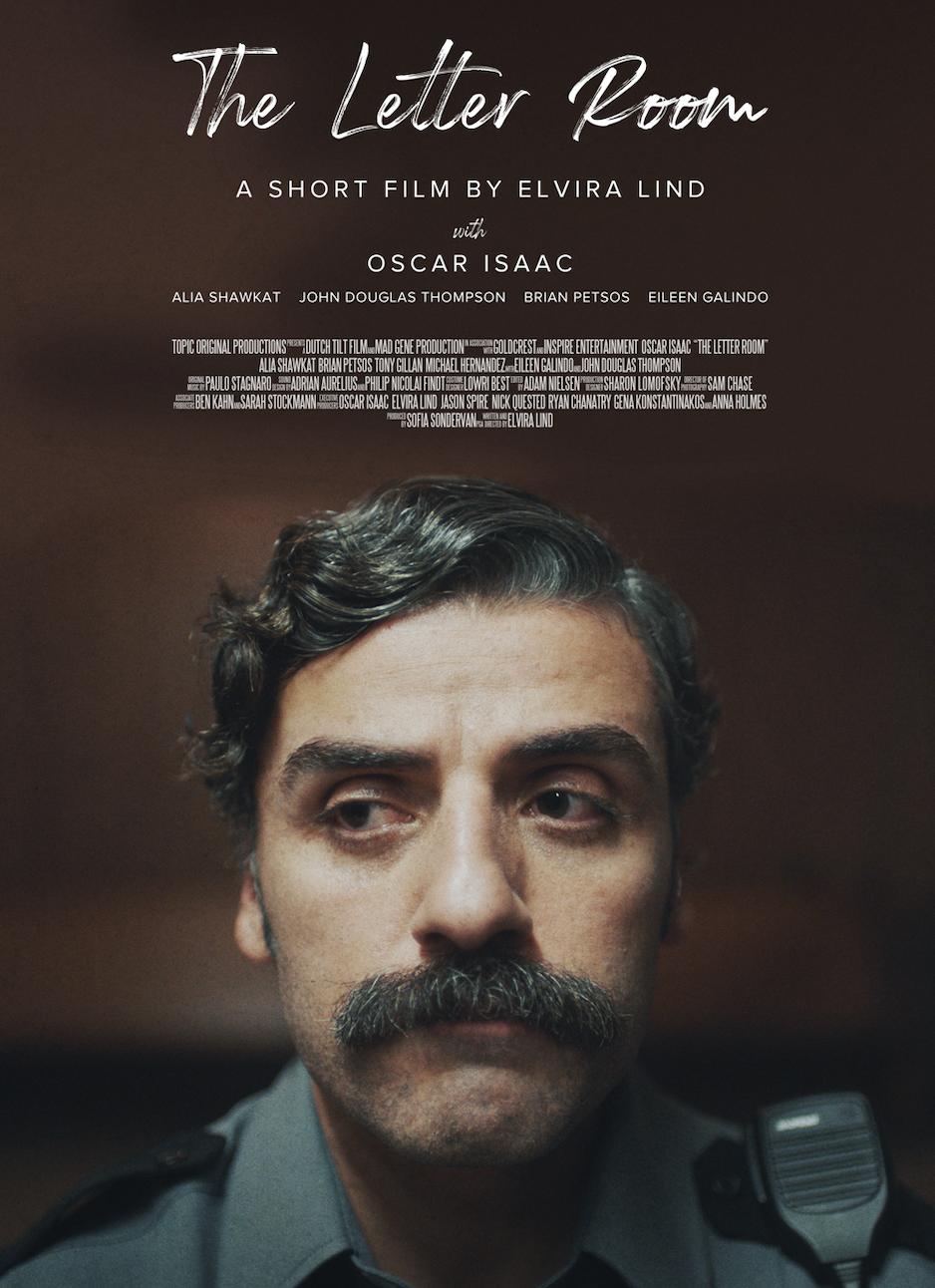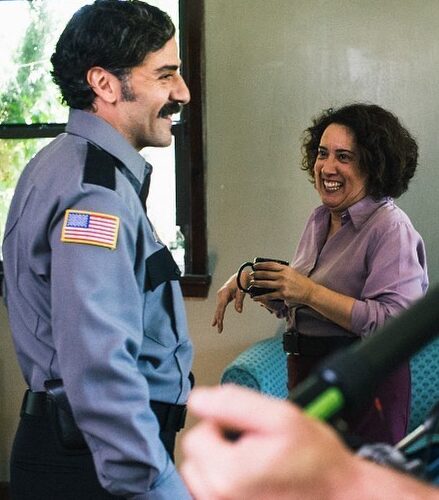Eileen Galindo is a film, theatre, and television actress who stars in the Academy Award-nominated short fiction film, The Letter Room. Last week, we chatted with the charismatic and talented Galindo about the film, the nomination, and her life as an actress, including her role in the upcoming second season of Paramount+’s Why Women Kill.
The Letter Room is a dark prison comedy directed by Elvira Lind, starring her husband Oscar Isaac, and Eileen Galindo. The short was recently nominated for the Academy Award of Best (Live Action) Short Film of 2021.
Oscar Isaac plays a correctional officer who is promoted to work in a prison’s letter room. Galindo’s character, the prison warden, is the one who promotes Isaac and guides him through this new role. In the letter room, Isaac’s character gets emotionally attached to the prisoners and their families through the correspondence he reads.
Watch the full interview here, or read an extract below.
How did you feel when knowing you were one of the highest recognitions on your work (the Oscar nomination)?
There are no words to describe it, I actually slept through the nomination so I woke up– I’m currently working on another show for Paramount+ called Why Women Kill. And I wasn’t working that morning, so I woke up about six, seven o’clock in the morning and my phone had blown up, and I thought, ‘Oh my god I’m late for work! I was supposed to be at work’, and it turned out that it was a nomination so, pretty amazing.
How did you prepare to get into the shoes of a prison warden? What did you turn to for inspiration?
Generally, whenever I’m creating a new character, I start really with visuals, actually, so I go with the script, and then I start to gather visuals. In this case, I looked up some female prison wardens and I just started to look at them and read. I read a couple of articles about their life and their point of view towards the prison system. And obviously, my character is the antagonist in the short, even though it’s a 30 minute short, my character’s function is to thwart Oscar from doing what he wants to do, which is to help connect the characters. He has all these wonderful ideas about how to rehabilitate the prisoners and bring more communication in the prison, and my characters like “Oh! No, no, no. This is what we’re doing, just like this.” So, I read a lot of different articles, I gather a lot of images. I’ll start posting a lot of things on Instagram, and yeah, just start collecting little ideas. And then when we got on set and we started to work on the scenes– what’s great about working with Elvira and with Oscar is that we start very slow. We have the script, and the first scene where I’m drinking a cup of coffee opposite him and you know we’re having this conversation, we just started drinking the coffee and looking at each other. I was sort of sizing him up and he was very uncomfortable, he didn’t know what to expect, he was coming there because he had been told that he was going to be getting a promotion. But he didn’t know what that was going to be. So we just go with those circumstances and then we see what comes out of that.
What does a script have to have, no matter what, for you to choose it?
Well, it’s interesting. For me, I think the main thing that I look for in characters is if I can relate to them. If I feel like I can portray an aspect of humanity that I recognize, then it becomes personal to me, and by being personal to me, it then is universal to the viewer. So I try to be as specific and personal, as I can be. And then, I always say that if I reach one person, if one person watches the project or watches the film or the TV show or, or comes to the theatre and sees the show and they said, I know that person, then I’ve done my job.
So, what caught your interest from this particular role, in The Letter Room?
Well, actually I didn’t initially I didn’t know what it was. Oscar and I had done a play together about 20 years ago, where I played his mother. And so throughout the years, we had stayed very close. This was before Star Wars, before any of the success in the movies and all that. So he called me and said, “Listen I have a role that I would love for you to play, we’re doing this little short film” and you know I was supposed to be in New York for another job, and that one fell through, so I said “Well, it just so happens I’m going to be in New York so yeah sure”, I said yes without even knowing what it was because I trust his artistic taste. And I think that’s the most important thing when you’re doing a project, you know, if you trust the people that you’re working with, then that opens up the possibility for great things to happen.
What would you say is the most relevant message you want someone to take away from the film?
I think the thing that is that’s most relevant to what we’re have all been going through in the last year is themes of isolation and how people not only long to connect, but it is human nature, the need to emotionally connect to each other. And, you know, in the past where we would do interviews, in person and now we’re all relegated to working on Zoom and, and it creates an artificial sense of closeness, but it’s not the same as being with that person and you know being able to look in their eyes and read the little details of them as a person. Oscar’s character is relegated to working in The Letter Room, and he gets emotionally connected to the letters that he’s reading that are being written to the prisoners, and without giving away the end of the movie, you know, it shows about these, these type of people that would rather live in the fantasy than in the reality. The inspiration for the film came because– a couple of different things. Elvira had listened to a podcast about a man that had been catfished and how when he found out that the person was not who he thought it was, how he longed to go back in time because he had such an emotional connection to this person that he was being catfished by. And at the same time, she also talked about a lot about, in Denmark, her native country, how there were these men that are in their 40s and they’ve never married and they live alone and they, you know, cook for themselves. There’s a great scene in the movie where Oscar’s cooking a meal for himself and he’s standing in front of the refrigerator and he’s eating out of the refrigerator, and you know we’ve all had that moment. If, especially if you’re someone that lives alone. So it just really highlighted the isolation and the loneliness that we’ve all had to experience this past year because we’ve all been stuck in our homes all over the world.


